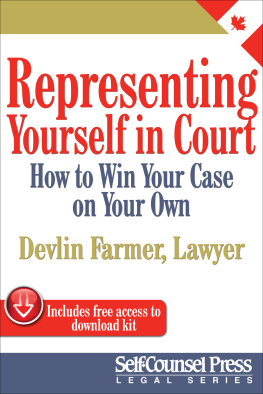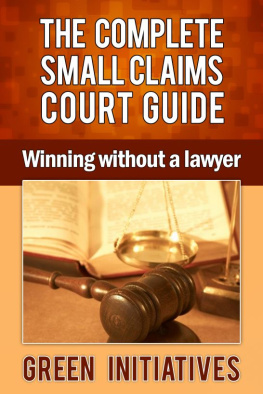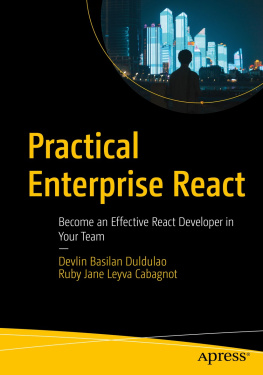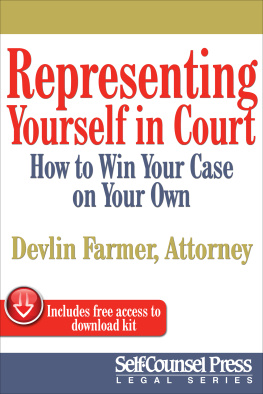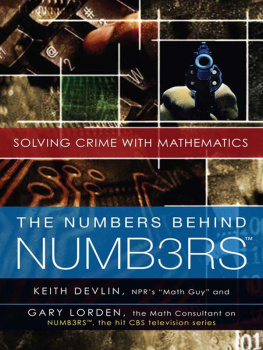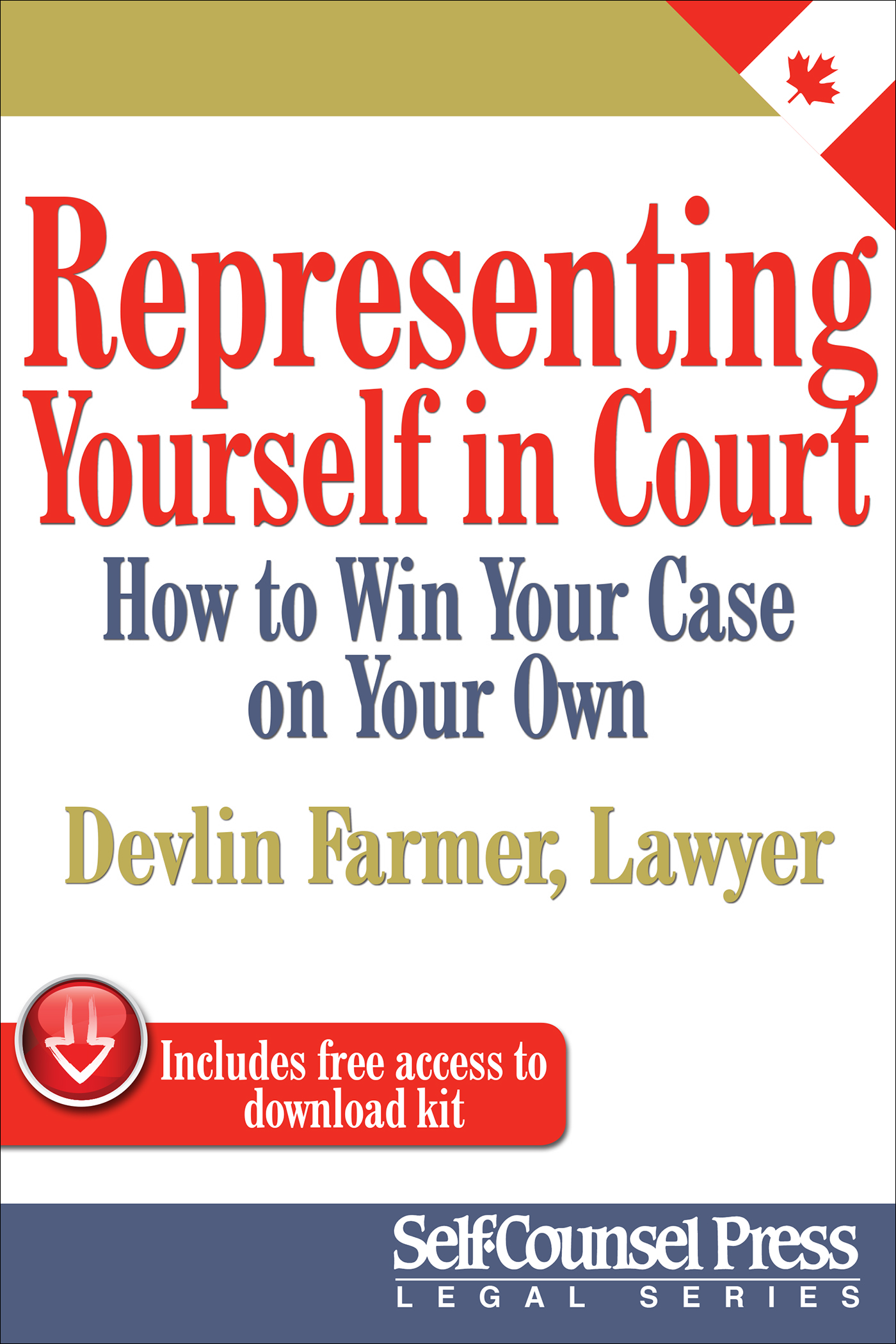An Introduction to Representing Yourself in Court
When you go to court you are asking a complete stranger (a judge) to make a decision about something he or she probably knows less about than you and the other party do.
Many of my clients have talked to me about wanting justice or wanting things to be fair. Who wouldnt want this? But going to court is not necessarily going to mean that what you think is fair and just is what the law and the trier of fact (the judge) in your case think is fair and just. The law is a blunt instrument for sorting out disputes. There are finer, more precise tools available, such as mediation. Try them first.
Going to court should be a last resort. Before going to court, you should have tried negotiating a solution to whatever it is youre dealing with; you should have also looked into alternatives to court such as mediation. Only when less adversarial options cannot offer a solution, is it time to seriously consider court. In other words, when there is no other way to solve a dispute, court is your last resort.
More and more self-represented people are appearing in court. (In some civil courts more than 50 percent of litigants are pro se.) Lawyers traditional bill-by-the-hour model and high retainer fees are simply out of reach for a large amount of average, working people.
The influx of non-lawyers into the Courts has necessitated change. Judges and court staff are gradually accepting that pro se litigants are here to stay. Self-help resources are increasingly available, and courts are more responsive to the needs of pro se litigants.
But changing the court system is not easy. Our courts rose out of exactly what their name suggests: a kings court. The language, rules, and procedure of going to court today hearken to a system that has roots in medieval England and which extend back to ancient Rome.
Today, you can still see barristers in black robes with ribbons around their necks bowing to a judge, hear lawyers throw around Latin phrases on a daily basis, and witness a formality and etiquette that has long since died out in other forms of society. Court is a hierarchal model with a judge sitting in an elevated position looking down on everyone else.
Appearing in court is intimidating. It can feel overwhelming. Heres a secret: Most lawyers are nervous going to court, and Im no exception.
The antidote is preparation, or knowing what youre heading into and being ready for it. I like to break the process down into steps. When Im at step one, I worry only about step one because I know that although step two is around the corner, Ive prepared for whats in front of me at the moment. Preparation is not only the way to battle nervousness, its also the key, the supreme weapon in fact, to winning your case.
The purpose of this book is twofold:
1. To give you an overview of the steps in the court process so that it does not feel as overwhelming when you represent yourself. It will help you to break the work youre going to need to do down into manageable steps with clear options. Because this book is an overview of going to court in Canada it is not specific to law in a particular province nor does it try to cite all the local rules on each topic. If I do quote any law, I will cite British Columbia law simply as an example. (Note that Federal and provincial law with the exception of Quebec is based on English common law. I am not licensed to practice law in Quebec and this book therefore does not cover how to go to provincial court in Quebec.)
You should always check what the specific law is in your jurisdiction and research how it applies to your unique case. As an overview, I hope this book will offer perspective as you do further research and choose your options. In other words, it is meant as a large scale map to help you see the big picture so that you can then zero in on what you need to know and do.
2. To give you a view into a lawyers working office so that you can use some of the tricks of the trade that lawyers use. As in any profession, lawyers use certain tools and have certain methods to save time, to stay organized, and to smoothly advance a case. For example, most lawyers assemble a book for each trial called a Trial Book. They dont share these books with their clients; they are just a tool for the lawyer, and its the lawyers blueprint for a trial. Ill help you to make your own Trial Book so you can represent yourself and use this tool too.
This book is designed to address civil legal claims only. For example, the kind of litigants I had in mind while writing this book were family law litigants, small claims, and housing/eviction cases. (These are classes of litigants that are increasingly going to court or an administrative tribunal without a lawyer.) Sometimes I will talk about other kinds of civil law cases, but this book does not apply to criminal cases. As well, the focus of this book is for assistance with a judge-alone trial, not a jury trial. Jury trials are very difficult to run for self-represented persons. Also jury trials may not be available for your kind of case (this will depend on your jurisdiction).
There are advantages to having a judge, who will likely be more experienced with self-represented persons and will have had training on deciding matters presented by self-represented persons, decide your case. (There may also be advantages to having a jury trial in your particular case and you would be well advised to seek the assistance of a lawyer in deciding whether to proceed with a jury or a judge-alone trial). My personal experience is with judge alone trials.
If you do have a jury trial, this book will still be helpful but you will need to do further research into the mechanics of a jury trial. I talk more about jury trials in Chapter 7: Pre-trial Procedures, Preparation, and Your Trial Book.
Because this book is an overview of the process of representing yourself in court, you will have to read up on the laws specific to your case. I will explain how to do that in Chapter 2: Learning the Law.
I also encourage you to read other books about how to present a case at trial. Different lawyers have different styles and different approaches. Many of us have concentrated on certain areas of law. For example, my background is mainly in family law, housing law, and professional ethics, though Ive worked in a number of other areas too. Other lawyers may concentrate on, for example, personal injury.
Some books are written by university professors, not lawyers who appear in court. There is no comprehensive, ultimate guide, but take what you need from this and other resources so that you too will walk into court nervous, yes, but prepared.
1. Vocabulary
Words are a big deal in law. Whole trials are about the interpretation of words. If there is a word in this book you dont understand, check the glossary in the download kit first. That will offer a basic definition. (If the word is important in your case, make sure you understand how that word is interpreted according to the law and case law in your jurisdiction.) If you still are unsure about a word in this book or in a legal resource, check a good law dictionary such as Blacks Law Dictionary or Canadian Law Dictionary by Stephen Couglan et al.
2. Whos Who in the Court Process
Youll need to know who the people involved in the court process are:
Plaintiff:

